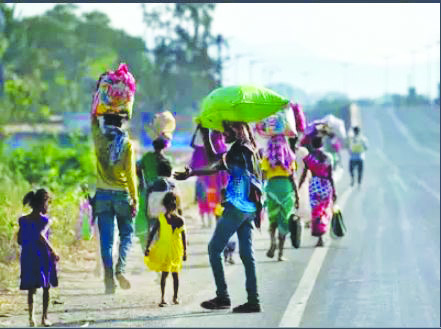VERDICT: The SC dismissed the demand of some states that it was illegal for the migrant labour to walk on the highways!
By Legal Correspondents
The SC rejected hundreds of PILs filed by employers and State and Central governments asserting the right of migrant labour to be compensated with food, shelter and fares back to their native place because of the inconvenience caused to them by the lockdown……
The Supreme Court on Thursday forbid the railways and State governments from exacting train or bus fares from stranded migrant workers waiting to return home amid the national lockdown.
The court directed that the State from where workers started their journey and the State where they were headed should pool their travel expenses between them. Workers waiting for their transport should be provided shelter, food and water by the State responsible. During train journey, railways would be in charge of providing migrant workers drinking water and meals. In case of bus journeys, the State where they started from had to take care of their food and water.
The court said that those found walking should be escorted to the nearest camps where they should be looked after. States should simplify and speed up the process of registration of migrant workers. After registration, they should be allowed to board buses or trains at the earliest. The receiving State, after the workers reached their native place, shall provide transport, health screening and other facilities free of cost. The court ordered States to set up help kiosks at places where migrant workers were stranded.
‘There are lapses’
A three-judge Bench observed in a six-page order in the suo motu case: “State Governments / Union Territories are taking steps to do the needful but there are several difficulties and lapses which are being noticed in the process of registration, transportation and in providing water, food, shelter to these migrant workers. It is also seen that even after registration, the migrant workers have to wait for a period which may go from a week to month for their turn to board the bus / train. A large number of migrant workers are still seen proceeding on foot to different places”.
When Solicitor-General Tushar Mehta wondered aloud whether this would encourage more people to walk, the court said dryly that they were already walking home. Many had decided to walk because they got no word from officials even after registering for a transport back to their villages.
Mr. Mehta said 3,700 Shramik Special trains were operated from May 1 to 27. So far, about 91 lakh migrants were shifted through by these trains and by road transport. Both the Centre and State governments “are of the view that no worker should undertake on-foot journey for their destination”.
‘Give numbers’
Besides these interim directions, the court also sought details from the government on the number of stranded workers, plans for their registration and transportation. A hearing has been scheduled for June 5.
A nearly three-hour hearing through videoconferencing witnessed the court question the government about its “lapses” in providing adequate food, shelter and transportation to thousands of migrant workers, triggering an exodus during the lockdown.
The Centre maintained that workers were “locally instigated” to walk home. Mr. Mehta said the government machinery, from the safai karamchari to the Prime Minister, were selflessly battling an “unprecedented crisis”. He blamed the “prophets of doom” and “armchair intellectuals” for stirring trouble and weakening the resolve. He questioned their patriotism. He said the court should not be allowed to be made into a political platform.
Uniform policy
The court asked why certain States had turned away migrant workers from their borders. There was need for a concrete and uniform policy between the Centre and States and among States as regard to the migrants’ crisis.
“Look to the future. How much time do you need to transport migrants workers? What is the monitoring mechanism to ensure food and basic necessities? It is not that the government is not doing enough but concrete steps need to be taken. Hard reality is that there is need for a mechanism to tackle the crisis”, the court observed.
Mr. Mehta said many workers had opted to stay back as workplaces were opening up. “Some isolated incidents” were highlighted to put the government’s efforts in a bad light.
Appearing for Congress leader Randeep Singh Surjewala, senior advocate A.M. Singhvi said the Centre still did not have a nationwide action plan to tally the exact number of labourers stranded in various parts of the country. The government should work with the grass roots administrative mechanism, including the district and panchayats, to create lists accurately identifying the stranded workers.
Senior advocate Kapil Sibal said migrant workers left government relief camps to walk home because of lack of “minimum standards” of food, water and shelter as required under the Disaster Management Act. “What food was provided to them? Pulses is not the answer. Where will they cook all this” he asked.
Senior advocate Indira Jaising urged the need for more trains, saying only three percent of them were used to transport workers. Four crore labourers were waiting to go home, she said.
Courtesy from The Hindu
